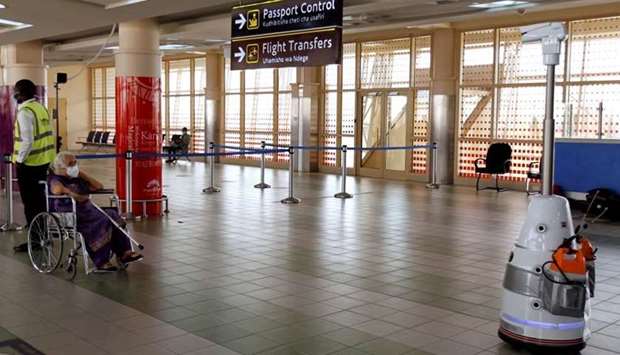Jasiri, Shujaa and Tumaini only landed in Kenya just over two weeks ago, but they're already playing an important role in curbing the spread of the country's coronavirus epidemic.
The three glossy white robots, made in China and donated by Japan and the United Nations Development Programme, have been put to work at Nairobi's main international airport, keeping it disinfected and monitoring arrivals for signs of the virus.
As Jasiri - a Swahili word meaning "brave" - does his rounds, he sprays fine jets of sanitiser from containers attached to his sides, and takes infrared pictures with a camera mounted on an extendable neck while scanning hundreds of passengers per minute.
He takes their temperatures, records their data for storage and, in tone-flat English, tells those not wearing masks to put them on and those standing too close to others to respect social distancing rules.
"Jasiri’s role in this airport is to enhance the safety of international travel," airport operations manager, Simon-Peter Njoroge told Reuters.
"This is one more example of how the future is going to look,. The future is going towards contactless travel, it's going towards automation, it's going towards a greater focus on ... health security.... I see that as a powerful force for the enhancement of air travel."
Meanwhile, the trio are also helping to curb the spread of an epidemic that has so far killed almost 1,800 and infected more than 100,000 in the East African nation - and saving passengers time on arrival formalities.
"There was a long queue but ...we have a system which can take more than one hundred people's temperature at the same time," said Major Pascal, from Burundi. "That is good."

A passenger waits near an anti-pandemic robot named Jasiri, used for temperature screening, disinfection, communication of health messages and data capture amid the coronavirus disease spread at Jomo Kenyatta International Airport in Nairobi, Kenya on February 12.
